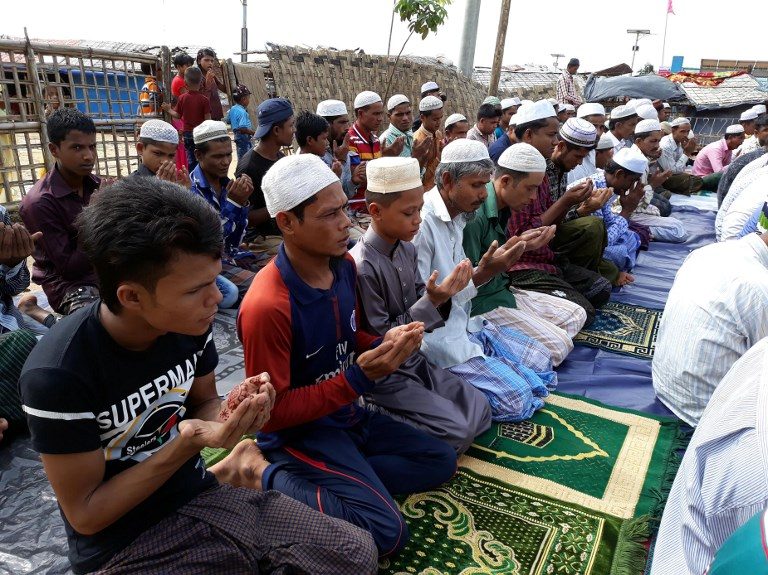SUMMARY
This is AI generated summarization, which may have errors. For context, always refer to the full article.

COX’S BAZAR, Bangladesh – As Muslims around the world celebrated Eid with feasting and gift-giving, Rohingya refugees in squalid Bangladesh camps marked the festival on Saturday, June 16, with a peaceful demonstration demanding justice and dignified repatriation.
For the hundreds of thousands of the Muslim minority who have fled neighboring Myanmar since an army crackdown last August, this is the first Eid-al-Fitr they have spent in the cramped tent cities.
Rahim Uddin, a 35-year-old refugee, told Agence France-Presse (AFP) that the holiday, which marks the end of the fasting month of Ramadan, was different this year.
“But God be praised, at least we have a peaceful place to stay and celebrate. We can go to the mosques without any interruption,” he said in the vast Kutupalong camp in Cox’s Bazar district.
The camp’s mosques were full on Saturday morning as refugees prayed for safety from flash floods and sudden landslides that they fear could be triggered by monsoon rains. They then exchanged embraces.
Later, as children roamed around in new clothes and enjoyed merry-go-round rides and other entertainment, hundreds of refugees staged an hour-long protest, a common occurrence in the camps.
Holding banners and placards, the demonstrators shouted slogans demanding Rohingya citizenship, dignified repatriation to Myanmar and security from the United Nations.
Community leader Mohammad Mohibullah told AFP they want the UN to “include a Rohingya representative in the repatriation agreement” procedure. The UN could not be reached for comment immediately.
About 700,000 Rohingya have arrived in Bangladesh since the crackdown that the UN and the US say amounted to “ethnic cleansing”, joining those who had fled earlier violence in mainly Buddhist Myanmar.
“I sold some rations in the local market to buy my children new clothes. They are very happy,” refugee Manu Mia said on Saturday, as many households prepared traditional desserts for the children.
Eighty-year-old Gul Meher made vermicelli called ‘semai’ for her son and 4 grandchildren.
“I feel very happy, though we managed to cook a very little, only for my grandkids,” she told AFP. – Rappler.com
Add a comment
How does this make you feel?
There are no comments yet. Add your comment to start the conversation.